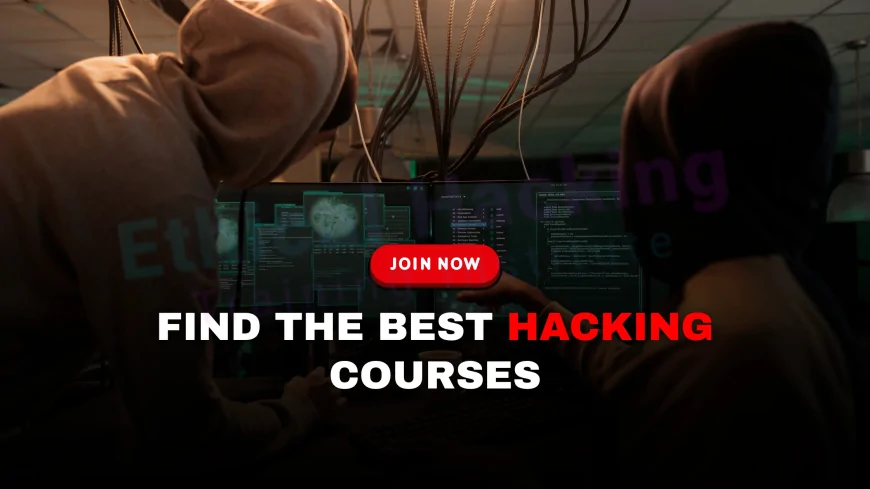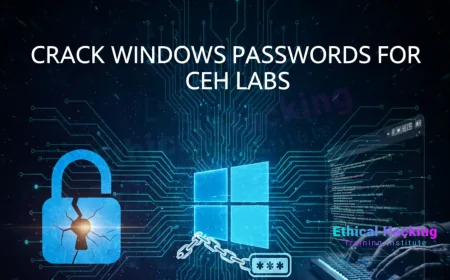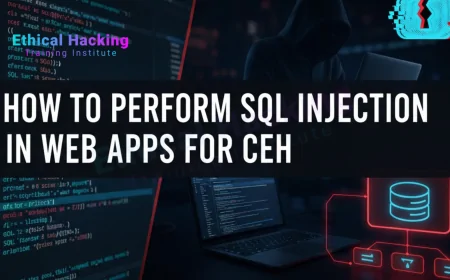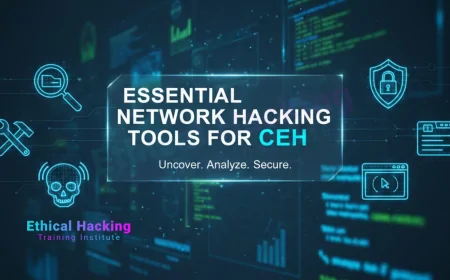Find the Best Hacking Courses Near You and Start Your Journey in Cybersecurity | Best Local Hacking Training Programs to Begin Your Cybersecurity Journey
Discover the best hacking courses near you to kickstart your cybersecurity career. Explore local and online ethical hacking classes, certifications, bootcamps, and hands-on labs tailored for beginners and professionals.

Table of Contents
- Introduction
- Why Choose Local or Hybrid Training?
- Types of Hacking Courses Available
- Evaluating and Comparing Courses
- Popular Certification Tracks
- Importance of Hands-On Labs
- Typical Course Costs
- How to Find Local Courses
- Online vs. In-Person Training
- Preparation & Study Tips
- Key Skills You’ll Learn
- Building a Cybersecurity Career
- After Certification & Recertification
- Frequently Asked Questions
- Conclusion
Introduction
Whether you're just starting out or looking to upskill, choosing the right hacking course is the first step toward a successful cybersecurity career. From official certifications to community-led workshops, this guide will help you evaluate, compare, and select the best local or hybrid hacking courses available.
Why Choose Local or Hybrid Training?
While online learning offers flexibility, local and hybrid hacking training programs bring several powerful advantages that can greatly accelerate your cybersecurity learning experience. Whether you're just starting out or transitioning into a security role, in-person interaction, structured labs, and real-time feedback make a significant difference.
- Hands-On Mentorship: Local instructors provide real-time feedback, guidance, and demonstrations that are difficult to replicate in fully online environments.
- Community & Peer Support: Joining a local class lets you collaborate with like-minded learners, build study groups, and expand your professional network.
- Structured Curriculum: Fixed schedules and guided labs help maintain learning discipline and reduce procrastination.
- Immediate Access to Labs: Physical access to lab infrastructure ensures you get uninterrupted hands-on experience with real-world tools and exploits.
- Career & Placement Assistance: Many local training centers offer job support, mock interviews, and direct connections to local employers.
In a hybrid model, you get the best of both worlds—online flexibility combined with live sessions or lab visits. For many aspiring ethical hackers, this blended approach is the most effective way to stay engaged, motivated, and job-ready.
Types of Hacking Courses Available
- Certificate programs: CEH, CompTIA Security+, PenTest+, OSCP and more.
- Bootcamps: Intensive 1–2 week courses with practical focus.
- Short workshops: Specialized sessions on web hacking, mobile security, or network defense.
- Self-paced online courses: Udemy, Coursera, Pluralsight, complement in-person learning.
- Community meetups & CTFs: Free group learning through capture-the-flag challenges.
How to Evaluate and Compare Courses
- Syllabus relevance: Ensure alignment with current certification topics (CEH v13, OSCP).
- Lab access: Practical time in virtual machines is critical.
- Instructor credentials: Look for certified professionals with field experience.
- Reviews and placements: Graduate testimonials, job support, and placement stats.
- Learning support: Mentorship, Q&A, community forums, post-workshop updates.
Popular Certification Tracks
- CEH (Certified Ethical Hacker): Offers end-to-end training on industry-standard hacking tools and ethical methodologies.
- OSCP (Offensive Security Certified Professional): A deeply hands-on penetration testing qualification.
- CompTIA Security+ & PenTest+: Vendor-neutral and ideal for foundational knowledge.
- eCPPT (eLearnSecurity): Focused on practical web application testing.
- Bug bounty & CTF-focused training: Skill-building for vulnerability hunters.
Importance of Hands-On Labs
Theoretical knowledge is essential, but hacking skills need real-world practice:
- EC-Council iLabs: Official labs for CEH certification.
- TryHackMe & Hack The Box: Interactive virtual hacking environments.
- Local classroom labs: Physical or virtual labs with mentor supervision.
- Build your own lab: Use VirtualBox or VMware to deploy Kali Linux, Metasploit, Burp Suite.
Typical Course Costs
- Workshop (1–2 days): ₹5k–15k / $50–200
- Bootcamp (1–2 weeks): ₹40k–₹100k / $500–2000
- Certification track (CEH, OSCP): ₹60k–₹150k / $1200–3000
- Self-paced online: $10–200 per course
- Community CTF events: Often free, sometimes $10–50
How to Find Local Courses Near You
- Search: “ethical hacking training near me” or “cybersecurity courses in [city]”.
- Check local universities: Many offer certification workshops or electives.
- Visit hacker meetups:Join ethical hacking communities by exploring meetups listed on Meetup.com, Eventbrite, or social media groups.
- Talk to recruiters: Many local firms sponsor or recommend cybersecurity trainings.
- Online forums: Reddit, LinkedIn, and InfoSec Discord servers can guide you.
Online vs. In-Person Training
| Feature | Online | In-Person / Local |
|---|---|---|
| Flexibility | High | Fixed schedule |
| Cost | Varies low to mid | Often higher |
| Mentorship | Virtual | Face-to-face |
| Networking | Limited | Strong local connections |
| Practical labs | Virtual labs (24/7) | Structured block sessions |
Study & Preparation Tips
- Develop a weekly schedule covering theory and labs.
- Set realistic goals: finish one module or lab per week.
- Join study groups or coordinate peer mock exams.
- Use flashcards for terminology and vulnerability types.
- Track progress, reflect on weak areas, adjust plan.
Key Skills You’ll Learn
- Network scanning & enumeration
- Web vulnerability exploitation (SQLi, XSS, CSRF)
- System hacking & privilege escalation
- Password cracking & cryptographic attacks
- Scripting automation with Python/Bash
- Report writing for clients and executives
Building a Cybersecurity Career
- Apply for roles like Security Analyst, Penetration Tester, or Incident Responder.
- Build a portfolio: projects, labs, bug reports.
- Gain bug bounty experience—platforms like HackerOne.
- Pursue advanced certifications: OSCP, CEH (Practical), CISSP.
- Join cybersecurity communities, attend conferences, build your brand.
After Certification & Recertification
Achieving a certification like CEH (Certified Ethical Hacker) is a major milestone—but the journey doesn’t end there. To stay relevant in the ever-evolving cybersecurity field, professionals must continue learning and maintain their credentials through periodic recertification.
For CEH holders, the certification is valid for three years. During this period, you must earn a total of 120 Continuing Education Credits (ECEs) by participating in approved activities such as:
- Attending webinars or workshops
- Publishing security-related articles or blogs
- Completing additional certifications
- Participating in security research or community projects
- Attending industry conferences or training sessions
All ECEs must be submitted via your EC-Council Aspen portal. Failing to maintain the required credits or pay annual membership fees may result in your certification becoming inactive.
Staying certified shows employers that you’re up-to-date with current threats, tools, and ethical hacking techniques. It also helps you maintain your professional credibility and unlock new career opportunities.
Frequently Asked Questions (FAQs)
1. What should I learn first: online or in-person?
Start with online if you need flexibility; in-person helps with hands-on mentoring and networking.
2. How do I budget for a hacking course?
Create a clear plan including tuition, materials, labs, and exam fees. Use scholarships or free labs when possible.
3. Are bootcamps worth it?
Yes—if you prefer accelerated learning and hands-on practice, bootcamps offer intense, focused training.
4. How long does a typical hacking course last?
Workshops: 1–2 days; Bootcamps: 1–2 weeks; Certification programs: 4–12 weeks.
5. Do I need math background?
Not really—basic logic and problem-solving are sufficient for most hacking courses.
6. How important are labs?
Labs are crucial—they allow you to practice real attack and defense scenarios.
7. Can I get certified just with online courses?
Yes—official platforms like EC‑Council iClass or Offensive Security fully support remote certification prep.
8. What tools will I learn?
Nmap, Wireshark, Metasploit, Burp Suite, SQLMap, John the Ripper, and more.
9. How do I choose the right certification?
Match it with your career goals: CEH for general hacking, OSCP for deep pentesting, Security+ for foundational IT security.
10. Is hacking training legal?
Yes, when done in authorized lab environments or with explicit permission.
11. Can I attend CTF events locally?
Yes—meetup.com or university clubs often host hackathons or CTF events.
12. How much experience do I need?
No experience needed for beginner courses; intermediate or cert-level tracks require some IT background.
13. Are there free hacking labs?
Yes—TryHackMe, OverTheWire, PortSwigger Academy, and Hacker101 offer quality free content.
14. Will certifications help with job placement?
Yes—certifications like CEH and OSCP are respected and often preferred in hiring processes.
15. What is the CEH practical exam?
A hands-on test where you solve real penetration tasks in a lab environment over a fixed time.
16. How can I network in cybersecurity?
Attend local meetups, Discord groups, LinkedIn events, and cybersecurity conferences.
17. Should I build a portfolio?
Absolutely—demonstrate your skills with lab write-ups, CTF scores, bug reports, and GitHub repos.
18. Is there a community I can join?
Yes—Reddit, InfoSec Discord servers, Slack channels, and local hacking groups are great for support.
19. How do I stay motivated?
Set concrete milestones, practice regularly, document your journey, and celebrate progress.
20. What's the next step after a course?
Build real-world experience via bug bounties, entry-level roles, or further certifications like OSCP or CISSP.
Conclusion
Finding the right hacking course—whether it's local, online, workshop-based, or a full certification track—can be the start of an exciting journey. Focus on hands-on labs, engaging instructors, and a roadmap that fits your goals. With dedication, you can build a secure foundation and launch a successful cybersecurity career.
What's Your Reaction?
 Like
0
Like
0
 Dislike
0
Dislike
0
 Love
0
Love
0
 Funny
0
Funny
0
 Angry
0
Angry
0
 Sad
0
Sad
0
 Wow
0
Wow
0


















